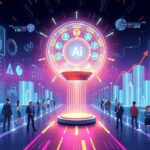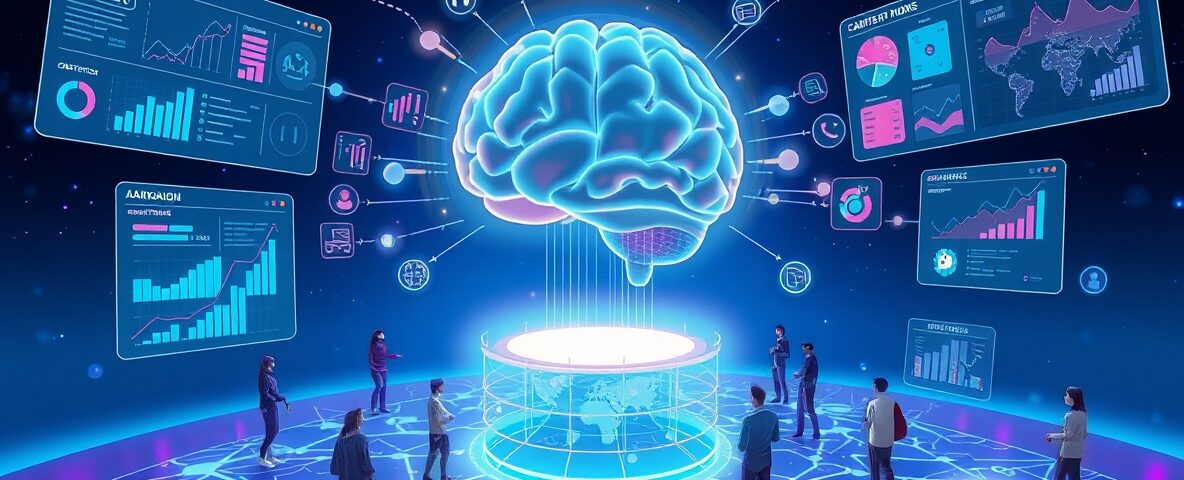
Get the Competitive Edge: AI-Powered Lead Generation for Sales Success
September 18, 2025
AI-Powered Content Creation: Transforming Blogs, Videos, and Visuals
September 18, 2025The Evolution of Marketing in the Digital Age
In the past, marketing efforts were limited to print media, TV advertisements, and cold calls – strategies that lacked the personalization and real-time relevance that modern consumers seek. With the advent of the digital age, marketing witnessed a seismic shift towards online platforms, social media, and influencer collaborations. This transition marked the birth of digital marketing – a realm where the landscape is ever-changing, and adaptability is paramount.
The Role of AI in Revolutionizing Marketing
Enter artificial intelligence – a game-changer in the marketing world. AI is not just a technological marvel confined to science fiction; it’s a tangible tool that empowers marketers with unprecedented capabilities. Through machine learning algorithms, AI analyzes vast datasets to uncover patterns, trends, and insights that would be virtually impossible for a human to detect manually. This analytical prowess enables businesses to make data-driven decisions and tailor their strategies with unparalleled precision. Additionally, AI’s role extends to content creation, personalization, and even predictive analytics – revolutionizing how campaigns are conceptualized, executed, and refined.

Laying the Foundation: Data and Analytics
In AI marketing, data and analytics are the bedrock upon which successful strategies are built.
Harnessing Big Data for Insights
Big Data, the massive volume of structured and unstructured information available, serves as a treasure trove of consumer insights. AI algorithms sift through this data, uncovering hidden correlations and patterns that can shape marketing strategies. For instance, businesses can decipher customer preferences and adapt their offerings by analyzing purchase histories, browsing behavior, and social interactions.
Predictive Analytics: Anticipating Customer Behavior
Predictive analytics, a subset of AI, empowers businesses to predict future behaviors based on historical data. By identifying recurring patterns and associations, AI algorithms can anticipate what customers want or need next. For instance, if a customer frequently buys hiking gear during spring, an AI-powered system might recommend related products in advance, enhancing the customer’s shopping experience and increasing the likelihood of conversion.
Personalization at Scale: Tailoring Experiences
The age of one-size-fits-all marketing is behind us. Today’s consumers demand tailored experiences that resonate with their individual preferences. AI makes this level of personalization feasible at scale. Businesses can segment their audiences through advanced algorithms based on demographics, behavior, and interactions. This segmentation allows for the creation of highly targeted campaigns that capture attention and foster a stronger emotional connection with the audience.

The Power of AI-Powered Content Creation
Content creation is the cornerstone of effective marketing. AI’s impact on this aspect is nothing short of transformative.
Automated Content Generation: Pros and Cons
AI-driven content generation expedites the process of producing written material. From product descriptions to blog posts, AI algorithms can generate text efficiently. However, while AI excels in developing factual content, it might need help with nuanced narratives or creative storytelling. Striking a balance between AI-generated content and human-authored pieces is crucial to maintain authenticity and emotional resonance.
Enhancing Creativity with AI Assistance
Writer’s block can be frustrating, but AI-powered tools act as your creative muse. These tools can suggest captivating headlines, engage introductions, and even generate ideas for your content. While AI can provide a starting point, it’s up to human writers to infuse the content with their unique perspective, voice, and flair.
Multilingual Content Expansion with AI
Expanding into international markets requires adapting content to different languages and cultural contexts. AI-driven translation tools can assist in this endeavor, enabling businesses to reach global audiences effectively. However, linguistic nuances and cultural sensitivities must be carefully considered to ensure the message resonates authentically with diverse audiences.

Hyper-Personalization: Crafting Targeted Campaigns
Hyper-personalization isn’t just a buzzword; it’s a strategic approach that can yield remarkable results.
Segmenting Audiences with Precision
AI’s ability to analyze vast datasets enables businesses to segment their audience with unparalleled precision. By considering factors such as demographics, past behaviors, and purchasing history, AI helps identify distinct customer segments. These segments can then be targeted with tailored campaigns that speak directly to their needs and desires.
Dynamic Content Customization
Imagine receiving an email that addresses you by name and showcases products and offers aligned with your preferences. Dynamic content customization, powered by AI, creates such personalized experiences. By leveraging real-time data, businesses can craft content that adapts based on the recipient’s behavior, leading to higher engagement and conversion rates.
Real-Life Examples of Hyper-Personalization
Retail giants like Amazon have mastered the art of hyper-personalization. Their recommendation engines analyze a customer’s browsing and purchase history to suggest products they’re likely to be interested in. This approach has transformed the online shopping experience, creating a sense of discovery and anticipation for customers.

AI in Customer Journey Mapping and Experience Enhancement
Understanding the customer journey and enhancing their experience is central to effective marketing.
Mapping Customer Touchpoints with AI
AI’s analytical capabilities enable businesses to map the customer journey, from initial awareness to post-purchase engagement. Businesses can optimize each stage by visualizing touchpoints, pain points, and opportunities to deliver a seamless and delightful experience.
Chatbots and Virtual Assistants: 24/7 Support
Customer expectations have evolved to include instant and round-the-clock support. AI-driven chatbots and virtual assistants provide timely responses to queries, troubleshoot issues, and even guide users through purchasing. This 24/7 support enhances customer satisfaction and frees up human agents to tackle more complex tasks.
Enhancing User Experience through AI-Driven Insights
AI doesn’t just stop at predicting behaviors; it also offers insights into user experience improvement. For instance, by analyzing user behavior on a website, AI can identify friction points that lead to cart abandonment. This information empowers businesses to make data-backed changes that optimize the user experience and boost conversions.

Optimizing Advertising and Marketing Spending with AI
The days of spray-and-pray marketing are over. AI brings precision and efficiency to ad campaigns.
Programmatic Advertising: Efficiency and Precision
Programmatic advertising, facilitated by AI, automates buying and placing ads. This efficiency allows businesses to reach the right audience at the right time with minimal wastage. AI analyzes data to identify optimal ad placements, ensuring your message reaches the most receptive audience.
AI-Powered A/B Testing for Campaign Optimization
A/B testing, a staple in marketing, becomes even more effective with AI. AI algorithms can rapidly analyze multiple variables and their impact on campaign performance, helping businesses make data-driven decisions for campaign optimization. This real-time feedback loop enables continuous improvement and maximizes ROI.
Cost-Effective Marketing Solutions with AI
AI doesn’t just enhance the efficacy of campaigns; it also offers cost-effective solutions. Businesses can allocate resources more efficiently by automating tasks that were once manual and time-consuming. This cost-saving potential benefits startups and small businesses with limited budgets.
Mastering the art of AI marketing requires a holistic understanding of its capabilities and strategic implementation. By harnessing the power of data, embracing AI-generated content, delivering hyper-personalized experiences, and optimizing advertising efforts, businesses can position themselves for remarkable growth in the digital era. However, as AI reshapes marketing landscapes, it’s crucial to navigate ethical considerations and balance automation and the human touch. The journey to 10x growth through AI marketing is exciting, and those who embrace it with creativity and strategic thinking are poised to achieve unparalleled success.


